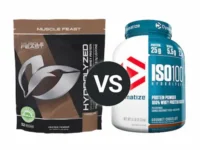Knowledge BaseYou're Questions Answered
Which whey protein is best for muscle building?
Whey protein is a popular and effective supplement for muscle building due to its high biological value, rapid absorption, and rich profile of essential amino acids, particularly branched-chain amino acids (BCAAs) like leucine, which is crucial for muscle protein synthesis. When choosing the best whey protein for muscle building, it's important to consider the different types of whey protein available: concentrates, isolates, and hydrolysates. Each form has unique characteristics that cater to different needs and goals.
Types of Whey Protein
1. Whey Protein Concentrates (WPC)
Whey protein concentrates are the least processed form, typically containing 70-80% protein by weight. They retain more of the naturally occurring nutrients found in whey, such as lactose, fats, and bioactive compounds. This type is often more affordable and can provide additional nutritional benefits beyond just protein. WPC is a good choice for those who are not lactose intolerant and are looking for a cost-effective option that also includes some beneficial fats and carbohydrates1.
2. Whey Protein Isolates (WPI)
Whey protein isolates undergo further processing to remove most of the lactose and fat, resulting in a product that is typically 90-95% protein by weight. This makes WPI an excellent choice for those who are lactose intolerant or who prefer a lower-calorie, higher-protein option. WPIs generally have a cleaner taste and mix well, making them ideal for those who want a more refined protein supplement2.
3. Whey Protein Hydrolysates (WPH)
Whey protein hydrolysates are partially hydrolyzed, meaning the proteins are pre-digested, making them easier and quicker to absorb. This process reduces the allergenic potential and speeds up the digestion process, making WPH a great option for post-workout recovery and for those who experience digestive issues with other types of whey protein. However, they are often more expensive and may have a slightly bitter taste3.
Choosing the Best Whey Protein for Muscle Building
The best whey protein for muscle building depends on individual goals, dietary restrictions, and budget. Here are some key factors to consider:
1. Quality:
Opt for whey protein powders sourced from grass-fed cows, as they are typically higher in beneficial nutrients like omega-3 fatty acids and conjugated linoleic acid (CLA). Minimally processed products tend to retain more of the natural goodness of whey.
2. Protein Content:
Look for a whey protein powder that provides at least 20-25 grams of protein per serving. This amount is generally effective for stimulating muscle protein synthesis post-exercise.
3. Amino Acid Profile:
A high-quality whey protein should have a comprehensive amino acid profile, rich in BCAAs, particularly leucine, which is essential for muscle growth.
4. Taste and Mixability:
Choose a product with good taste and mixability, as this will encourage consistent use. Whether you prefer a smooth shake or a thicker texture, ensure the protein powder dissolves well without clumping.
5. Price:
While price is an important factor, it shouldn't compromise quality. There are good options across all price ranges, so choose a product that fits your budget and meets your nutritional needs.
Top Choices for Muscle Building
Based on these criteria, here are some starting suggestions:
- For Budget-Conscious Users: A high-quality whey protein concentrate like Optimum Nutrition Gold Standard Whey, which provides a balanced profile of protein and other nutrients.
- For Lactose Intolerance: A whey protein isolate such as Dymatize ISO100, known for its purity and minimal lactose content.
- For Fast Recovery: A whey protein hydrolysate like Sascha Fitness Hydrolyzed, which offers rapid absorption and minimal digestion issues.
- Smith, J. W., & Fukagawa, N. K. (2014). The digestion and absorption of protein. In Introduction to Human Nutrition (pp. 45-65). Wiley Blackwell.
- Devries, M. C., & Phillips, S. M. (2015). Supplemental protein in support of muscle mass and health: advantage whey. Journal of Food Science, 80(S1), A8-A15.
- Ha, E., & Zemel, M. B. (2003). Functional properties of whey, whey components, and essential amino acids: mechanisms underlying health benefits for active people (review). Journal of Nutritional Biochemistry, 14(5), 251-258.
Related Questions
Related Reviews

Your Answer
We are a participant in the Amazon Services LLC Associates Program, an affiliate advertising program designed to provide a means for us to earn fees by linking to Amazon.com and affiliated sites.



